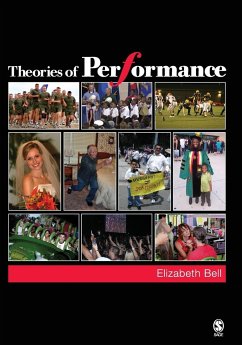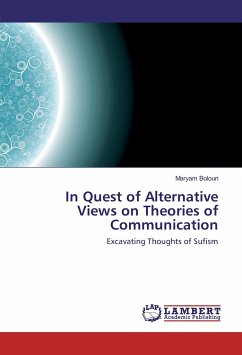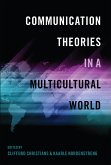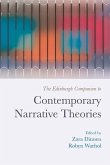Elizabeth Bell
Theories of Performance
Elizabeth Bell
Theories of Performance
- Broschiertes Buch
- Merkliste
- Auf die Merkliste
- Bewerten Bewerten
- Teilen
- Produkt teilen
- Produkterinnerung
- Produkterinnerung
Theories of Performance invites students to explore the possibilities of performance for creating, knowing, and staking claims to the world. Each chapter surveys, explains, and illustrates classic, modern, and postmodern theories that answer the questions, "What is performance?" "Why do people perform?" and "How does performance constitute our social and political worlds?" The chapters feature performance as the entry point for understanding texts, drama, culture, social roles, identity, resistance, and technologies. Written specifically for the undergraduate classroom, performance theories…mehr
Andere Kunden interessierten sich auch für
![Social Theories of the Press Social Theories of the Press]() Hanno HardtSocial Theories of the Press176,99 €
Hanno HardtSocial Theories of the Press176,99 €![In Quest of Alternative Views on Theories of Communication In Quest of Alternative Views on Theories of Communication]() Maryam BolouriIn Quest of Alternative Views on Theories of Communication46,99 €
Maryam BolouriIn Quest of Alternative Views on Theories of Communication46,99 €![Case Studies on Family Communication Theories in Indonesia Case Studies on Family Communication Theories in Indonesia]() Case Studies on Family Communication Theories in Indonesia30,99 €
Case Studies on Family Communication Theories in Indonesia30,99 €![Theories of Informetrics and Scholarly Communication Theories of Informetrics and Scholarly Communication]() Theories of Informetrics and Scholarly Communication20,99 €
Theories of Informetrics and Scholarly Communication20,99 €![Understanding Foreign Correspondence Understanding Foreign Correspondence]() Understanding Foreign Correspondence88,90 €
Understanding Foreign Correspondence88,90 €![Communication Theories in a Multicultural World Communication Theories in a Multicultural World]() Communication Theories in a Multicultural World44,45 €
Communication Theories in a Multicultural World44,45 €![The Edinburgh Companion to Contemporary Narrative Theories The Edinburgh Companion to Contemporary Narrative Theories]() The Edinburgh Companion to Contemporary Narrative Theories277,99 €
The Edinburgh Companion to Contemporary Narrative Theories277,99 €-
-
-
Theories of Performance invites students to explore the possibilities of performance for creating, knowing, and staking claims to the world. Each chapter surveys, explains, and illustrates classic, modern, and postmodern theories that answer the questions, "What is performance?" "Why do people perform?" and "How does performance constitute our social and political worlds?" The chapters feature performance as the entry point for understanding texts, drama, culture, social roles, identity, resistance, and technologies. Written specifically for the undergraduate classroom, performance theories are explained in ways accessible to students, relevant to their lives, and richly illustrated with examples that encourage students to think more, to think harder, and to think differently about performances around them.
Hinweis: Dieser Artikel kann nur an eine deutsche Lieferadresse ausgeliefert werden.
Hinweis: Dieser Artikel kann nur an eine deutsche Lieferadresse ausgeliefert werden.
Produktdetails
- Produktdetails
- Verlag: Sage Publications, Inc
- Artikelnr. des Verlages: B26378P
- Seitenzahl: 322
- Erscheinungstermin: 11. Februar 2008
- Englisch
- Abmessung: 254mm x 178mm x 17mm
- Gewicht: 608g
- ISBN-13: 9781412926386
- ISBN-10: 1412926386
- Artikelnr.: 23067934
- Herstellerkennzeichnung
- Libri GmbH
- Europaallee 1
- 36244 Bad Hersfeld
- gpsr@libri.de
- Verlag: Sage Publications, Inc
- Artikelnr. des Verlages: B26378P
- Seitenzahl: 322
- Erscheinungstermin: 11. Februar 2008
- Englisch
- Abmessung: 254mm x 178mm x 17mm
- Gewicht: 608g
- ISBN-13: 9781412926386
- ISBN-10: 1412926386
- Artikelnr.: 23067934
- Herstellerkennzeichnung
- Libri GmbH
- Europaallee 1
- 36244 Bad Hersfeld
- gpsr@libri.de
Elizabeth is a hard of hearing disabled mother of two kids including one on the spectrum. She as been writing since she was little to make up for the lack of sounds she grew up with. Currently she has 12 books on Amazon and loves horror.
Chapter 1: Introducing Theories of Performance Theory in Perspective: Can You See the Forest for the Trees? What Is Theory? Theory Questions: What? Why? How? Kinds of Theory Questions Assumptions about How Language Operates in Theory Two Models of Communication Performance as a Communicative Form Assumptions about Performance: Mimesis, Poiesis, and Kinesis Performance as a Key Term Definitions of Performance Claims about Performance: Constitutive, Epistemic, and Critical Rethinking Theory and Performance Chapter 2: Constituting Performance Theory in Perspective: What Makes a Performance? The "Nature" of Performance Constituting Performance through Framing Constituting the Performance Frame through Keying Constituting Performance through the Performer Constituting Performance through Audience Rethinking Performance Chapter 3: Performing Texts Theory in Perspective: What Is a Text? Humans and Symbol Use: Text Me Later. OK? From Orality to the Page to the Screen Interpreting the World as "Text" When Text Meets Performance Drama, Script, Theater, and Performance Assumptions about Texts: Canon, Textuality, and Materiality Interpreting Texts Text Versus Performance Rethinking Texts Chapter 4: Performing Drama Theory in Perspective: How Is the World a Stage? The Drama of a Roller Coaster Ride Reigning Metaphor: Life as Drama What Is Aristotelian Drama? Audience and Dramatic Form Kenneth Burke
s Dramatism: Life Is Drama Performing Tragic and Comic Attitudes From Dramatism to Social Drama Analyzing Social Dramas Social Drama: Raw Material for Performances Rethinking Drama Chapter 5: Performing Culture Theory in Perspective: How Do Cultures Perform? What Is Culture? Approaches to Studying Culture From Studying "Man" to Theorizing Movement and Play Rites of Passage: Moving through Culture Homo Ludens/Playing Man Characteristics of Ritual Rituals Are Performed From Great Tradition to Cultural Performance The "Performance Turn" in Study of Culture Performing History Performing Others Rethinking Culture Chapter 6: Performing Social Roles Theory in Perspective: Who Am I? Don
t Play Games with Me! "What
s Wrong?" "What
s Right?" Teams: Performing Together Regions: Performing Spaces When Good Performances Go Bad Impression Management Misrepresentation Role Distance and Discrepant Roles Stigmas and "Spoiled" Identities Passing Genders and Races Performing Disability Rethinking Social Roles Chapter 7: Performing Identity Theory in Perspective: How Am I a Subject? Do Social Roles Assume a Foundational Self? Performativity
s Rejections and Projects Performativity Project 1: Identity Constitution as Material and Historical Performativity Project 2: A Strategy for Identity Critique From Philosophy to Speech Act to Laws Performativity Project 3: A Political Practice of Identity Rethinking Identity Chapter 8: Performing Resistance Chapter 8: Performing Resistance Theory in Perspective: How Can Performance Change the World? From Aristotle to Postmodernism Bertolt Brecht on Performing Resistance Alienation Effects of Epic Theater Brechtian Techniques as Critical Lenses From Brecht to Boal Why Do People Take to the Streets? Models of Protest Public Events through an Aristotelian Lens Carnival and Protest From Traditional to Radical Dramaturgy Analyzing Protest Events as Performances The Body Politic: How Do Bodies Intervene? Resistance in Everyday Life: Foucault
s Productive Power Resistance in Everyday Life: de Certeaüs Strategies and Tactics Rethinking Resistance Chapter 9: Performing Technologies Chapter 9: Performing Technology Theory in Perspective: What Exists? Caveat Emptor: Buyer Beware of Old and New What Is Technology? Extending Human Bodies and Powers From Deus ex Machina to Flash Mobs: Extending, Enabling, and Accessing Performance Performance Presence: An Ontology Six Types of Theatrical Presence Losing the Aura of Presence Simulacra: There Is No Original Cyborg Bodies: Human and Machine Performing Cyborgs Musical Performance: Is it Live or Is It Memorex? Interactivity: From "Poke and See," Cyberpoetry, to Computer Art Environments Reach Out and Perform Someone: Five Kinds of Mediated Presence Rethinking Technologies References
s Dramatism: Life Is Drama Performing Tragic and Comic Attitudes From Dramatism to Social Drama Analyzing Social Dramas Social Drama: Raw Material for Performances Rethinking Drama Chapter 5: Performing Culture Theory in Perspective: How Do Cultures Perform? What Is Culture? Approaches to Studying Culture From Studying "Man" to Theorizing Movement and Play Rites of Passage: Moving through Culture Homo Ludens/Playing Man Characteristics of Ritual Rituals Are Performed From Great Tradition to Cultural Performance The "Performance Turn" in Study of Culture Performing History Performing Others Rethinking Culture Chapter 6: Performing Social Roles Theory in Perspective: Who Am I? Don
t Play Games with Me! "What
s Wrong?" "What
s Right?" Teams: Performing Together Regions: Performing Spaces When Good Performances Go Bad Impression Management Misrepresentation Role Distance and Discrepant Roles Stigmas and "Spoiled" Identities Passing Genders and Races Performing Disability Rethinking Social Roles Chapter 7: Performing Identity Theory in Perspective: How Am I a Subject? Do Social Roles Assume a Foundational Self? Performativity
s Rejections and Projects Performativity Project 1: Identity Constitution as Material and Historical Performativity Project 2: A Strategy for Identity Critique From Philosophy to Speech Act to Laws Performativity Project 3: A Political Practice of Identity Rethinking Identity Chapter 8: Performing Resistance Chapter 8: Performing Resistance Theory in Perspective: How Can Performance Change the World? From Aristotle to Postmodernism Bertolt Brecht on Performing Resistance Alienation Effects of Epic Theater Brechtian Techniques as Critical Lenses From Brecht to Boal Why Do People Take to the Streets? Models of Protest Public Events through an Aristotelian Lens Carnival and Protest From Traditional to Radical Dramaturgy Analyzing Protest Events as Performances The Body Politic: How Do Bodies Intervene? Resistance in Everyday Life: Foucault
s Productive Power Resistance in Everyday Life: de Certeaüs Strategies and Tactics Rethinking Resistance Chapter 9: Performing Technologies Chapter 9: Performing Technology Theory in Perspective: What Exists? Caveat Emptor: Buyer Beware of Old and New What Is Technology? Extending Human Bodies and Powers From Deus ex Machina to Flash Mobs: Extending, Enabling, and Accessing Performance Performance Presence: An Ontology Six Types of Theatrical Presence Losing the Aura of Presence Simulacra: There Is No Original Cyborg Bodies: Human and Machine Performing Cyborgs Musical Performance: Is it Live or Is It Memorex? Interactivity: From "Poke and See," Cyberpoetry, to Computer Art Environments Reach Out and Perform Someone: Five Kinds of Mediated Presence Rethinking Technologies References
Chapter 1: Introducing Theories of Performance Theory in Perspective: Can You See the Forest for the Trees? What Is Theory? Theory Questions: What? Why? How? Kinds of Theory Questions Assumptions about How Language Operates in Theory Two Models of Communication Performance as a Communicative Form Assumptions about Performance: Mimesis, Poiesis, and Kinesis Performance as a Key Term Definitions of Performance Claims about Performance: Constitutive, Epistemic, and Critical Rethinking Theory and Performance Chapter 2: Constituting Performance Theory in Perspective: What Makes a Performance? The "Nature" of Performance Constituting Performance through Framing Constituting the Performance Frame through Keying Constituting Performance through the Performer Constituting Performance through Audience Rethinking Performance Chapter 3: Performing Texts Theory in Perspective: What Is a Text? Humans and Symbol Use: Text Me Later. OK? From Orality to the Page to the Screen Interpreting the World as "Text" When Text Meets Performance Drama, Script, Theater, and Performance Assumptions about Texts: Canon, Textuality, and Materiality Interpreting Texts Text Versus Performance Rethinking Texts Chapter 4: Performing Drama Theory in Perspective: How Is the World a Stage? The Drama of a Roller Coaster Ride Reigning Metaphor: Life as Drama What Is Aristotelian Drama? Audience and Dramatic Form Kenneth Burke
s Dramatism: Life Is Drama Performing Tragic and Comic Attitudes From Dramatism to Social Drama Analyzing Social Dramas Social Drama: Raw Material for Performances Rethinking Drama Chapter 5: Performing Culture Theory in Perspective: How Do Cultures Perform? What Is Culture? Approaches to Studying Culture From Studying "Man" to Theorizing Movement and Play Rites of Passage: Moving through Culture Homo Ludens/Playing Man Characteristics of Ritual Rituals Are Performed From Great Tradition to Cultural Performance The "Performance Turn" in Study of Culture Performing History Performing Others Rethinking Culture Chapter 6: Performing Social Roles Theory in Perspective: Who Am I? Don
t Play Games with Me! "What
s Wrong?" "What
s Right?" Teams: Performing Together Regions: Performing Spaces When Good Performances Go Bad Impression Management Misrepresentation Role Distance and Discrepant Roles Stigmas and "Spoiled" Identities Passing Genders and Races Performing Disability Rethinking Social Roles Chapter 7: Performing Identity Theory in Perspective: How Am I a Subject? Do Social Roles Assume a Foundational Self? Performativity
s Rejections and Projects Performativity Project 1: Identity Constitution as Material and Historical Performativity Project 2: A Strategy for Identity Critique From Philosophy to Speech Act to Laws Performativity Project 3: A Political Practice of Identity Rethinking Identity Chapter 8: Performing Resistance Chapter 8: Performing Resistance Theory in Perspective: How Can Performance Change the World? From Aristotle to Postmodernism Bertolt Brecht on Performing Resistance Alienation Effects of Epic Theater Brechtian Techniques as Critical Lenses From Brecht to Boal Why Do People Take to the Streets? Models of Protest Public Events through an Aristotelian Lens Carnival and Protest From Traditional to Radical Dramaturgy Analyzing Protest Events as Performances The Body Politic: How Do Bodies Intervene? Resistance in Everyday Life: Foucault
s Productive Power Resistance in Everyday Life: de Certeaüs Strategies and Tactics Rethinking Resistance Chapter 9: Performing Technologies Chapter 9: Performing Technology Theory in Perspective: What Exists? Caveat Emptor: Buyer Beware of Old and New What Is Technology? Extending Human Bodies and Powers From Deus ex Machina to Flash Mobs: Extending, Enabling, and Accessing Performance Performance Presence: An Ontology Six Types of Theatrical Presence Losing the Aura of Presence Simulacra: There Is No Original Cyborg Bodies: Human and Machine Performing Cyborgs Musical Performance: Is it Live or Is It Memorex? Interactivity: From "Poke and See," Cyberpoetry, to Computer Art Environments Reach Out and Perform Someone: Five Kinds of Mediated Presence Rethinking Technologies References
s Dramatism: Life Is Drama Performing Tragic and Comic Attitudes From Dramatism to Social Drama Analyzing Social Dramas Social Drama: Raw Material for Performances Rethinking Drama Chapter 5: Performing Culture Theory in Perspective: How Do Cultures Perform? What Is Culture? Approaches to Studying Culture From Studying "Man" to Theorizing Movement and Play Rites of Passage: Moving through Culture Homo Ludens/Playing Man Characteristics of Ritual Rituals Are Performed From Great Tradition to Cultural Performance The "Performance Turn" in Study of Culture Performing History Performing Others Rethinking Culture Chapter 6: Performing Social Roles Theory in Perspective: Who Am I? Don
t Play Games with Me! "What
s Wrong?" "What
s Right?" Teams: Performing Together Regions: Performing Spaces When Good Performances Go Bad Impression Management Misrepresentation Role Distance and Discrepant Roles Stigmas and "Spoiled" Identities Passing Genders and Races Performing Disability Rethinking Social Roles Chapter 7: Performing Identity Theory in Perspective: How Am I a Subject? Do Social Roles Assume a Foundational Self? Performativity
s Rejections and Projects Performativity Project 1: Identity Constitution as Material and Historical Performativity Project 2: A Strategy for Identity Critique From Philosophy to Speech Act to Laws Performativity Project 3: A Political Practice of Identity Rethinking Identity Chapter 8: Performing Resistance Chapter 8: Performing Resistance Theory in Perspective: How Can Performance Change the World? From Aristotle to Postmodernism Bertolt Brecht on Performing Resistance Alienation Effects of Epic Theater Brechtian Techniques as Critical Lenses From Brecht to Boal Why Do People Take to the Streets? Models of Protest Public Events through an Aristotelian Lens Carnival and Protest From Traditional to Radical Dramaturgy Analyzing Protest Events as Performances The Body Politic: How Do Bodies Intervene? Resistance in Everyday Life: Foucault
s Productive Power Resistance in Everyday Life: de Certeaüs Strategies and Tactics Rethinking Resistance Chapter 9: Performing Technologies Chapter 9: Performing Technology Theory in Perspective: What Exists? Caveat Emptor: Buyer Beware of Old and New What Is Technology? Extending Human Bodies and Powers From Deus ex Machina to Flash Mobs: Extending, Enabling, and Accessing Performance Performance Presence: An Ontology Six Types of Theatrical Presence Losing the Aura of Presence Simulacra: There Is No Original Cyborg Bodies: Human and Machine Performing Cyborgs Musical Performance: Is it Live or Is It Memorex? Interactivity: From "Poke and See," Cyberpoetry, to Computer Art Environments Reach Out and Perform Someone: Five Kinds of Mediated Presence Rethinking Technologies References








